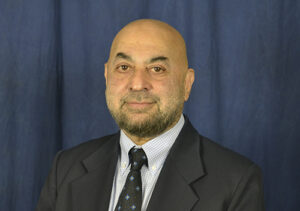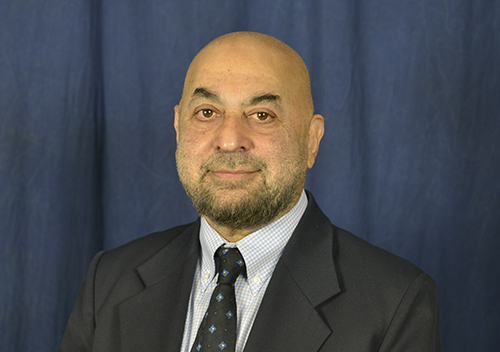
DANBURY, Connecticut — Western Connecticut State University Professor of Management Dr. Mohinder Dugal is the most recent member of the university community to receive the prestigious Fulbright for Research and Teaching Award from the U.S. Department of State and the Fulbright Foreign Scholarship Board. Dugal, who teaches the capstone Strategic Management course to both undergraduate and MBA students at WCSU’s Ancell School of Business, recently spent 10 months in Bahrain to study Public-Private-Partnerships (PPPs) in the Gulf region.
Now that he is back on campus, Dugal has shared some of the similarities and differences between Western Connecticut and Middle Eastern culture and collegiate life, and the value he places on the Fulbright experience.
“Before applying for a Fulbright Scholar award, I, like most Americans, was only vaguely aware of the existence of a tiny island country called the Kingdom of Bahrain, located somewhere in the Middle East,” Dugal said. “The country itself is an archipelago of 33 islands, of which only the three largest are inhabited. Bahrain is a mostly low-lying desert country, and despite its small size (total area of about 275 square miles or 1/20th the size of Connecticut) the country has a long, complex and important history. It was the seat of the famous ancient civilization of Dilmun,” he said, adding that “the word ‘Bahrain’ means ‘two seas’ in Arabic, and ships traveling eastward from the mouth of the Tigris and Euphrates Rivers would stop there to garner supplies of fresh water, vegetables and dates. Even today, off the coast of Bahrain, springs of potable water rise up out of the salt waters of the Gulf like geysers.”
Fresh water is not the only resource found in Bahrain, Dugal continued. “In 1932, Bahrain became the first Arabian Gulf country to discover recoverable commercial quantities of oil. However, since Bahrain’s supply of oil is quite small, especially by Gulf standards, the economy today is heavily dependent on revenues from tourism and the financial services industries. Approximately one-third of Bahrain’s population is comprised of immigrants and guest workers from South Asia (mostly India, Pakistan, Bangladesh), Africa (Kenya and Tanzania), and Southeast Asia (Philippines). It is a racially, religiously and culturally diverse cosmopolitan society, and English is widely spoken by locals of all backgrounds.”
In addition to his research into Public-Private-Partnerships in the Gulf Cooperation Council, Dugal taught two capstone MBA classes at the University of Bahrain, the largest in the country and the first one in the Middle East to have an American Studies Center. “My varied teaching, research and service experiences at the university were culturally rich and professionally satisfying,” he said. “The University of Bahrain is large with an enrollment of over 25,000 students. Contrary to Western perceptions, two-thirds of the students are women and about 50% of the faculty are women as well. Bahrain is probably the most liberal Middle Eastern country.”
There is a lot of U.S. influence in Bahrain, Dugal added. There are many Americans there, many of whom are in the U.S. Navy, and their busiest street is called Avenue of the Americas, where you can find every U.S. fast food restaurant and a proliferation of Pizza Huts and Starbucks. Friday is considered a day for prayers in Islam; therefore Friday and Saturday constitute the weekend in Bahrain. And by mid-afternoon on Thursday, Dugal said, students are already in “weekend mode,” in much the same way that American students sometimes tend to be on Friday afternoons. The country comes alive on weekends, when tourists from neighboring countries such as Saudi Arabia, Jordan and Kuwait drive in over a 16-mile causeway to enjoy its beaches and international cuisine.
Dugal’s immersion in and appreciation for Bahraini culture and history was certainly memorable, but perhaps more important is that Dugal accomplished what he had projected in his Fulbright application. “I was awarded the prestigious scholarship to teach MBA students, conduct research on Public-Private-Partnerships (PPPs), and to develop academic partnerships with universities in the Middle East/North Africa (MENA) region to foster global business education opportunities for students and faculty,” he said. “It has been especially rewarding to have had the chance to mentor many Bahraini students who are so welcoming, so interested in what we have to bring to them, and so eager to share their own culture with us. I look forward to sharing the rewards of my experiences there with the WCSU community, and to continue exploring the many exciting possibilities for interdisciplinary collaborations with colleagues in the Middle East.”
Dugal also hopes to become a campus ambassador for fellow faculty and students who are considering pursuing a Fulbright opportunity. Several WCSU faculty members and students have received Fulbright Awards in recent years. To learn more about student experiences, visit www.wcsu.edu/fulbright/.
For more information, contact WCSU Public Relations at pr@wcsu.edu. For more information about the Fulbright Program, visit http://eca.state.gov/fulbright.
Western Connecticut State University changes lives by providing all students with a high-quality education that fosters their growth as individuals, scholars, professionals and leaders in a global society. Our vision: To be widely recognized as a premier public university with outstanding teachers and scholars who prepare students to contribute to the world in a meaningful way.
For over 75 years, the Fulbright Program has provided more than 400,000 participants – chosen for their academic merit and leadership potential – with the opportunity to exchange ideas and contribute to finding solutions to challenges facing our communities and our world. More than 800 U.S. scholars, artists, and professionals from all backgrounds teach or conduct research overseas through the Fulbright U.S. Scholar Program annually. Additionally, over 1,900 diverse U.S. students, artists, and early career professionals in more than 100 different fields of study receive Fulbright U.S. Student Program grants annually to study, teach English, and conduct research overseas.

